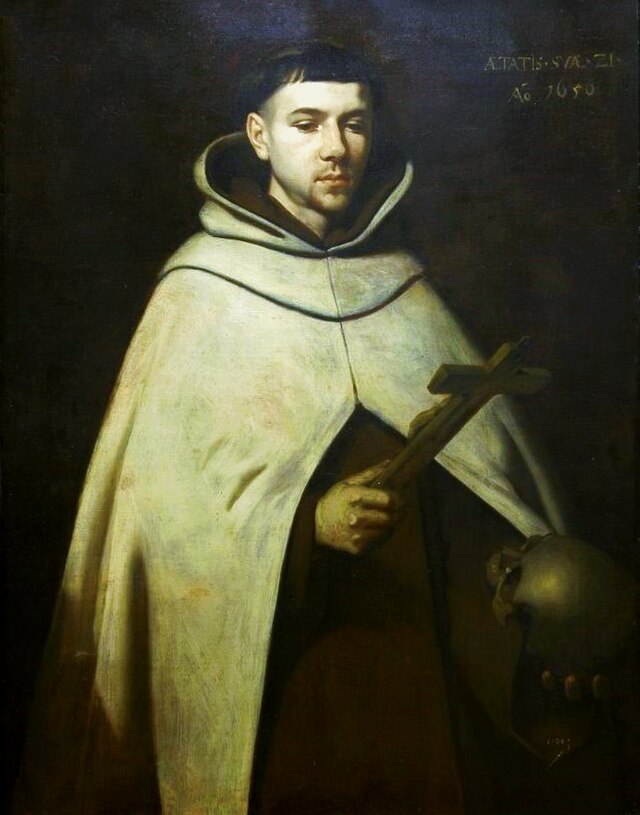Saint John of the Cross
Feast Day: December 14
Saint John of the Cross was a Spanish Catholic priest from the 16th century, and is one of the 36 Doctors of the Church. Why does he have the title “of the Cross”? To imitate the totality of Christ’s offering to the Father to become holy.
Born near Avila in Spain. As a child, he was playing near a pond one day; he slid into the depths of the water, but came up unharmed and did not sink again. A tall and beautiful Lady came to offer him her hand. No, said the child, you are too beautiful; my hand will dirty yours. Then an elderly gentleman appeared on the shore and extended his staff to the child to bring him to shore. These two were Mary and Joseph. Another time he fell into a well, and it was expected he would be retrieved lifeless. But he was seated and waiting peacefully. A beautiful lady, he said, took me into her cloak and sheltered me. Thus John grew up under the gaze of Mary.
One day he was praying Our Lord to make known his vocation to him, and an interior voice said to him: You will enter a religious Order, whose primitive fervor you will restore. He was twenty-one years old when he entered Carmel, and although he concealed his exceptional works, he outshone all his brethren. He dwelt in an obscure corner whose window opened upon the chapel, opposite the Most Blessed Sacrament. He wore around his waist an iron chain full of sharp points, and over it a tight vestment made of reeds joined by large knots. His disciplines were so cruel that his blood flowed in abundance. The priesthood only redoubled his desire for perfection. He thought of going to bury his existence in the Carthusian solitude, when Saint Teresa, whom God enlightened as to his merit, made him the confidant of her projects for the reform of Carmel and asked him to be her auxiliary.
John retired alone to a poor and inadequate dwelling and began a new kind of life, conformed with the primitive Rules of the Order of Carmel. Shortly afterwards two companions came to join him; the reform was founded. It was not without storms that it developed, for hell seemed to rage and labor against it, and if the people venerated John as a Saint, he had to accept, from those who should have seconded him, incredible persecutions, insults, calumnies, and even prison. When Our Lord told him He was pleased with him, and asked him what reward he wished, the humble religious replied: To suffer and to be scorned for You. His reform, though approved by the General of the Order, was rejected by the older friars, who condemned the Saint as a fugitive and an apostate and cast him into prison, from which he only escaped, after nine months’ suffering, with the help of Heaven and at the risk of his life. He took refuge with the Carmelite nuns for a time, saying his experience in prison had been an extraordinary grace for him. Twice again, before his death, he was shamefully persecuted by his brethren, and publicly disgraced.
When he fell ill, he was given a choice of monasteries to which he might go; he chose the one governed by a religious whom he had once reprimanded and who could never pardon him for it. In effect, he was left untended most of the time, during his last illness. But at his death the room was filled with a marvelous light, and his unhappy Prior recognized his error, and that he had mistreated a Saint. After a first exhumation of his remains, they were found intact; many others followed, the last one in 1955. The body was at that time found to be entirely moist and flexible still.
Saint John wrote spiritual books of sublime elevation. He was proclaimed a Doctor of the Church in 1926 by Pope Pius XI.
Patronage
Mystics
Source: sanctoral.com

Birthplace
Born
30 June 1542
Fontiveros, Ávila, Crown of Castile (Spain)
Death
14 December 1591 (Age 49)
Úbeda, Jaén, Crown of Castile (Spain)
Canonized
27 December 1726 (Pope Benedict XIII)
Shrine/Relics/Tomb
Segovia, Spain
Learn more:
Franciscan Media
Saint John of the Cross – FranciscanMedia.org
John is a saint because his life was a heroic effort to live up to his name: “of the Cross.” The folly of the cross came to full realization in time. “Whoever wishes to come after me must deny himself, take up his cross, and follow me” (Mark 8:34b) is the story of John’s life. The Paschal Mystery—through death to life—strongly marks John as reformer, mystic-poet, and theologian-priest…
Word On Fire
St. John of the Cross and the Divine Alchemy – WordOnFire.org
December 14, 2020 — St. John of the Cross (1542-1591) is one of the most profound spiritual masters in the history of the Church. Yet his writings are often perceived as being too deep or “out of my league” for many…
